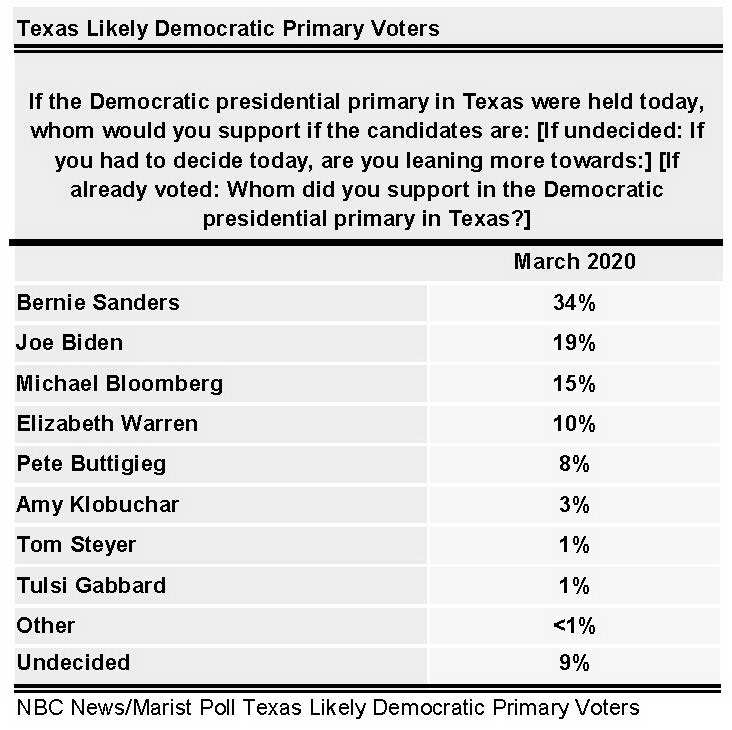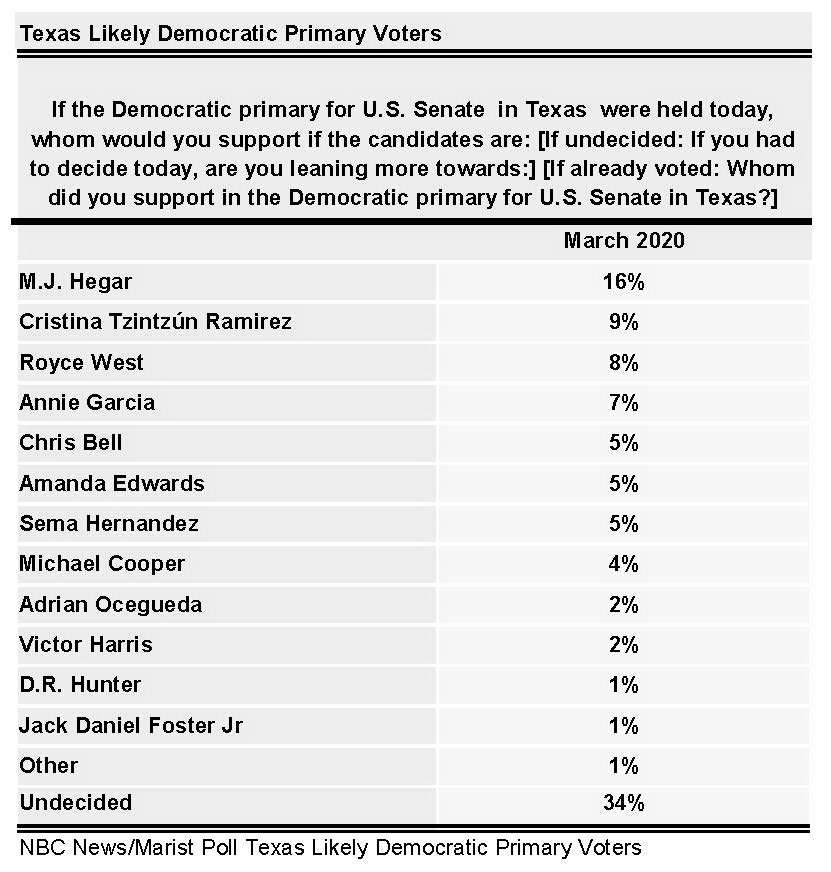In the Democratic presidential primary contest in Texas, Bernie Sanders (34%) has a commanding lead over Joe Biden (19%) and Michael Bloomberg (15%), among likely Democratic primary voters including those who are undecided yet leaning toward a candidate or who have already voted. Elizabeth Warren (10%) is the only other candidate who receives double-digit support. 23% of likely Democratic primary voters are persuadable. That is, they are either undecided or might change their mind before heading to the polls.

“Texas is the second-largest delegate trove of the 14 states on Super Tuesday with 228 delegates at stake,” says Dr. Lee M. Miringoff, Director of The Marist College Institute for Public Opinion. “Sanders is positioned to carry the state although nearly one in four likely voters is still on the fence.”
Sanders receives majority support (53%) from likely Democratic primary voters who are under the age of 45, including 57% of Millennials and Gen Z. Biden (10%) and Bloomberg (8%) trail far behind Sanders among likely Democratic primary voters under the age of 45.
Sanders (47%) is running up the score over his competitors, Biden (12%), Bloomberg (11%), and Buttigieg (11%) with independents likely to cast a ballot in the Democratic primary. Sanders (46%) also outdistances Biden (14%), Warren (13%), and Bloomberg (11%) among likely Democratic primary voters who identify as progressive. Among Latinos, Sanders (46%) also has a sizeable advantage over Bloomberg (14%) and Biden (13%). Among whites, Sanders (28%) has a healthy, yet smaller, lead over Biden (16%), Warren (15%), and Bloomberg (14%). Regardless of gender, Sanders is ahead. Although, compared to Biden, Sanders does better among men (+28 points) than women (+7 points).
Biden (27%) bests Bloomberg (21%) and Sanders (18%) among members of the likely Democratic primary electorate who are age 45 or older. Biden (30%) is also +6 points over Sanders (24%) among African Americans. Bloomberg receives 20% among this group. Among likely Democratic primary voters who identify as moderate, Biden (26%) is competitive with Sanders (22%).
59% of likely Democratic primary voters with a candidate preference say they strongly support their choice of candidate. More than two in three Sanders’ supporters (68%), compared with 52% of Biden’s supporters and 51% of Bloomberg’s backers, report a strong commitment to their candidate.
46% of the likely Democratic primary electorate think it is more important that the party’s nominee is closest to them on the issues while 44% believe it is more important that the nominee has the best chance of defeating President Donald Trump in November. Among Democrats, 49% prioritize electability over positions on the issues (41%). In contrast, a majority of independents (57%) emphasize a candidate’s positions on the issues rather than their ability to defeat Trump (32%).
Progressives and moderates are mirror images of each other. 49% of progressives say a candidate’s stance on the issues is more important while 42% say electability is crucial. Moderates report the exact opposite.
Sanders (43%) has more than three times the support of either Biden (13%) or Bloomberg (13%) among likely Democratic primary voters who think it is more important that the party’s nominee reflect their positions on the issues. Sanders (25%) and Biden (24%) are competitive among those who favor electability.
President Trump (94%) has an overwhelming lead over Bill Weld (4%) among likely Republican primary voters in Texas including those who are undecided yet leaning toward a candidate or who have voted already. 84% of likely Republican primary voters with a candidate preference say they strongly support their choice of candidate.
Texans divide about the president’s job performance. 46% of adults statewide say they approve of how he is doing his job, including 31% who strongly do so. 44% disapprove, including 31% who are strongly of this opinion.
In hypothetical general election matchups against the president, Trump is +4 percentage points over both Sanders and Biden. Against Sanders, 49% of registered voters in the state are for Trump while 45% are for Sanders. The contest is identical against Biden. Trump receives 49% support to 45% for the former vice president. Trump carried Texas by nine points over Hillary Clinton in 2016.

In each of these potential contests, Trump leads Sanders and Biden among white voters, especially those without a college degree, men, including a majority of those who live in small cities or the suburbs, and voters over the age of 45.
Sanders has a commanding lead among independents while Biden edges Trump among these voters. The Democrats also have the advantage over Trump among African Americans, Latinos, women, including a majority of those who live in small cities or suburbs, and voters under the age of 45.
48% of Texas voters prefer a Congress controlled by Republicans as a result of November’s elections. 42% want one controlled by Democrats. Among independents, 43% want the Democrats in command, and 36% want the Republicans at the helm. A notable 21% are unsure.
In a very crowded field, there is no clear frontrunner in the race for the Democratic nomination for U.S. Senate. MJ Hegar is the only candidate who receives double-digit support (16%) among likely Democratic primary voters, and a notable 34% are undecided. Not surprisingly, only 38% of likely Democratic primary voters with a candidate preference say they strongly support their choice of candidate, and 22% say they might vote differently on primary day. With 50% needed to avoid a runoff, it is very likely that the top two vote getters on Tuesday will face each other in May.

In a hypothetical general election contest, against incumbent John Cornyn, Cornyn (49%) is +8 points over Hegar (41%) among Texas registered voters. In 2014, Cornyn carried the state by 28 points.
Complete March 1, 2020 NBC News/Marist Poll Release of Texas
Complete March 1, 2020 NBC News/Marist Poll of Texas (Annotated Questionnaire)
Complete March 1, 2020 NBC News/Marist Poll of Texas (Tables)

